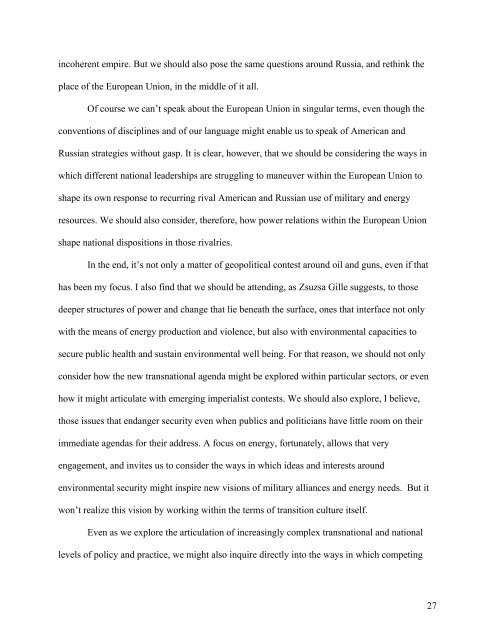from transition to hegemony - The Watson Institute for International ...
from transition to hegemony - The Watson Institute for International ...
from transition to hegemony - The Watson Institute for International ...
You also want an ePaper? Increase the reach of your titles
YUMPU automatically turns print PDFs into web optimized ePapers that Google loves.
incoherent empire. But we should also pose the same questions around Russia, and rethink the<br />
place of the European Union, in the middle of it all.<br />
Of course we can’t speak about the European Union in singular terms, even though the<br />
conventions of disciplines and of our language might enable us <strong>to</strong> speak of American and<br />
Russian strategies without gasp. It is clear, however, that we should be considering the ways in<br />
which different national leaderships are struggling <strong>to</strong> maneuver within the European Union <strong>to</strong><br />
shape its own response <strong>to</strong> recurring rival American and Russian use of military and energy<br />
resources. We should also consider, there<strong>for</strong>e, how power relations within the European Union<br />
shape national dispositions in those rivalries.<br />
In the end, it’s not only a matter of geopolitical contest around oil and guns, even if that<br />
has been my focus. I also find that we should be attending, as Zsuzsa Gille suggests, <strong>to</strong> those<br />
deeper structures of power and change that lie beneath the surface, ones that interface not only<br />
with the means of energy production and violence, but also with environmental capacities <strong>to</strong><br />
secure public health and sustain environmental well being. For that reason, we should not only<br />
consider how the new transnational agenda might be explored within particular sec<strong>to</strong>rs, or even<br />
how it might articulate with emerging imperialist contests. We should also explore, I believe,<br />
those issues that endanger security even when publics and politicians have little room on their<br />
immediate agendas <strong>for</strong> their address. A focus on energy, <strong>for</strong>tunately, allows that very<br />
engagement, and invites us <strong>to</strong> consider the ways in which ideas and interests around<br />
environmental security might inspire new visions of military alliances and energy needs. But it<br />
won’t realize this vision by working within the terms of <strong>transition</strong> culture itself.<br />
Even as we explore the articulation of increasingly complex transnational and national<br />
levels of policy and practice, we might also inquire directly in<strong>to</strong> the ways in which competing<br />
27
















